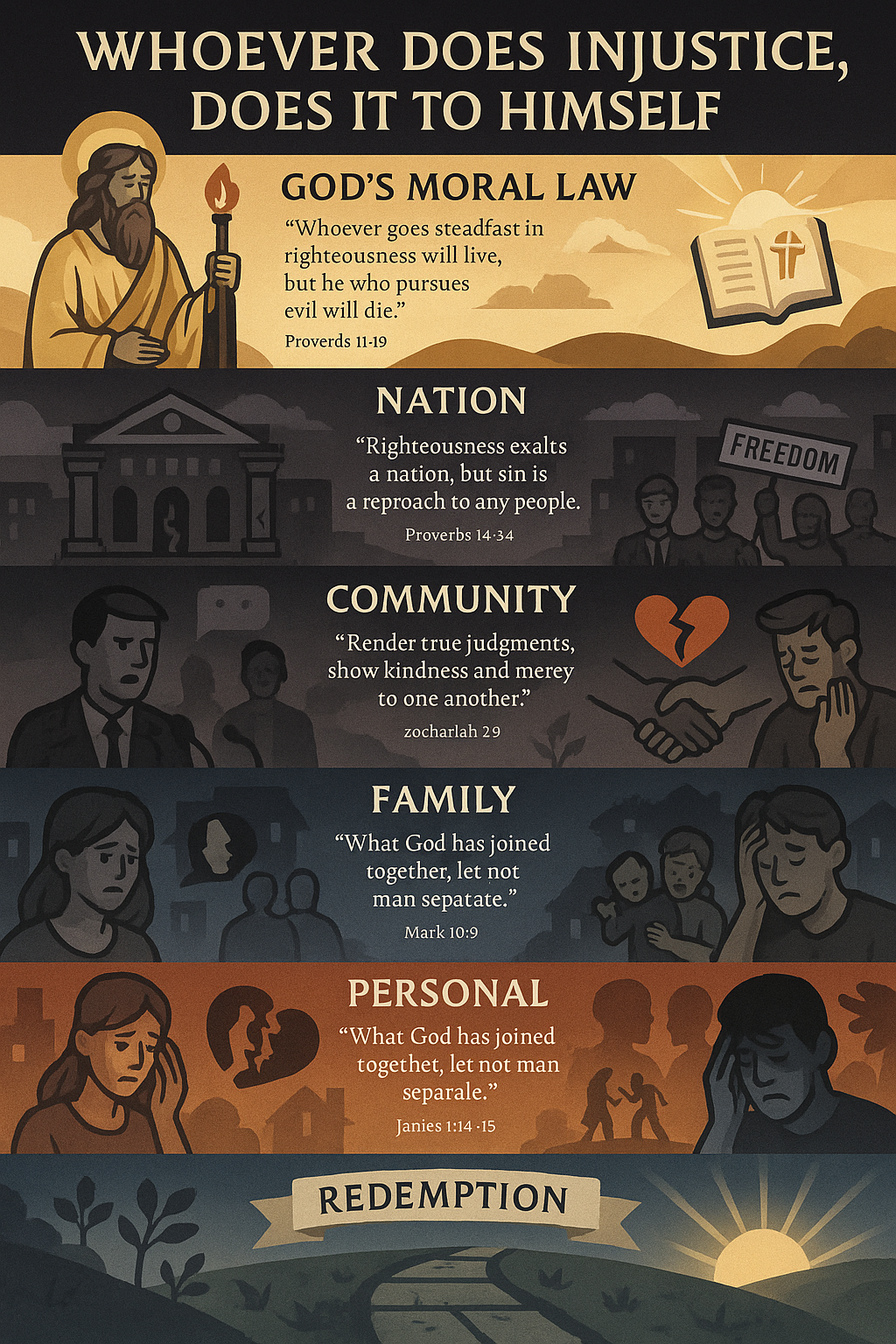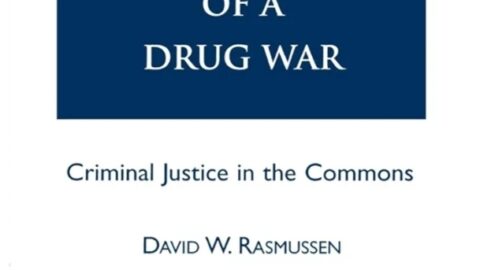Introduction: Injustice Is Self-Destruction
Marcus Aurelius’ reflection—“Whoever does wrong wrongs himself; whoever does injustice, does it to himself, making himself evil”—is not merely Stoic philosophy. It aligns deeply with biblical truth and moral law. Wrongdoing, whether it be personal sin, abuse of power, or betrayal of sacred trust, is never isolated in its consequence. It corrupts the soul of the doer and often devastates the innocent.
From a biblical and philosophical lens, injustice is a form of self-harm, whether committed by nations, families, or individuals. This article explores what this looks like across five spheres: God’s view of justice, nations, communities, families (especially in light of Jesus’ teaching on divorce), child-rearing, and personal conduct.
I. A Godly View: Sin as Self-Corruption
Throughout Scripture, sin is portrayed not only as disobedience to God, but as self-defilement.
“But the things that come out of a person’s mouth come from the heart, and these defile them.” – Matthew 15:18
“He who sins against me injures himself; all those who hate me love death.” – Proverbs 8:36
To commit injustice—whether through pride, deceit, or betrayal—is not simply to harm others. It is to darken the conscience, sear the soul, and invite decay from within. God does not merely punish sin arbitrarily; He allows us to reap what we sow, because unrighteousness naturally destroys the soul and fractures relationships.
II. In the Nation: Political Injustice Destroys Sovereignty
When nations commit injustice—through corruption, oppression, unjust wars, or manipulation—they may seem to prosper temporarily. But like Marcus Aurelius taught, injustice ultimately harms the doer.
“Righteousness exalts a nation, but sin is a reproach to any people.” – Proverbs 14:34
What it looks like:
- Governments suppress truth to maintain control, but lose the trust of their people.
- Legal systems that favor the powerful produce apathy, rebellion, or collapse.
- Societies that ignore justice crumble under the weight of internal decay.
Example: A state that legalizes divorce for convenience may believe it is increasing “freedom,” but over time it destroys the foundation of family, leads to fatherlessness, depression, and national instability.
Injustice on a national level leads to moral blindness, weakened institutions, and eventual bondage—as forewarned by the Tytler Cycle and echoed in prophetic biblical history (e.g., Israel, Babylon, Rome).
III. In the Community: Injustice Breeds Fear and Distrust
Communities that tolerate injustice—be it slander, favoritism, abuse, or lawlessness—slowly lose their moral compass.
“You shall not pervert justice… you shall not show partiality… you shall follow what is altogether just.” – Deuteronomy 16:19-20
When people:
- Cover up abuse “to protect reputation,”
- Excuse corruption “because it benefits us,” or
- Remain silent in the face of evil “to keep peace,”
They betray not only others, but themselves. Their community becomes fragile. Trust erodes. Fear replaces peace. Cowardice masquerades as compassion. And soon, even the righteous feel unsafe.
Injustice makes cowards out of communities.
IV. In the Family: Divorce and the Destruction of the Covenant
When Jesus was asked about divorce, He said:
“Because of the hardness of your hearts Moses permitted you to divorce your wives; but from the beginning it was not so.” – Matthew 19:8
Divorce, like other forms of betrayal, is not just the end of a contract—it is often the breaking of a sacred covenant, one intended to reflect the steadfast love of God.
What does injustice in marriage look like?
- Abandoning a spouse for selfish reasons.
- Using legal loopholes to escape responsibility.
- Infidelity, deception, or emotional cruelty.
When one breaks covenant unjustly:
- They harm the spouse and children,
- But also fracture their own soul,
- Losing sensitivity, trustworthiness, and often peace.
Jesus does not simply forbid divorce to impose rules, but because unrighteous separation breaks the divine image embedded in marriage—and the one doing the injustice damages themselves spiritually, morally, and relationally.
V. In Raising Children: Injustice Wounds Generations
Parents commit injustice when:
- They discipline in anger rather than love,
- Show favoritism,
- Neglect spiritual formation,
- Divorce casually,
- Or manipulate their children for emotional control.
“Fathers, do not provoke your children to wrath, but bring them up in the discipline and instruction of the Lord.” – Ephesians 6:4
What does this injustice look like to the child?
- Confusion: “Is this what love is?”
- Rebellion or deep internal guilt.
- Difficulty trusting future authority figures or even God.
But the parent who wrongs a child also damages their own ability to love, parent, and mature. They may harden their heart and lose the very joy they were meant to cultivate.
VI. In the Individual: Sin Corrupts from the Inside Out
As Marcus Aurelius said, “he who does injustice makes himself evil.” In biblical terms:
“Each person is tempted when he is lured and enticed by his own desire. Then desire… gives birth to sin, and sin… brings forth death.” – James 1:14–15
This is the root of all sin:
- You lie? You damage your integrity.
- You lust? You weaken your power to love purely.
- You betray? You become harder, colder, more fragile inside.
Sin is self-harm disguised as freedom.
The great tragedy of sin is not just what it does to others—but what it does to you.
Conclusion: Injustice as Self-Betrayal—and the Path to Restoration
Whether a ruler or a father, a nation or a neighbor, when we do wrong, we do it first to ourselves. Injustice might grant temporary advantage, but it leaves the soul stained, the conscience seared, and relationships wounded.
“Do not be deceived: God is not mocked. For whatever one sows, that will he also reap.” – Galatians 6:7
But the story doesn’t end there.
Restoration is possible:
- Through repentance (admitting wrong),
- Through humility (seeking truth),
- Through Christ (whose mercy repairs what our injustice destroyed).
The highest form of justice is not punishment, but redemption. Yet redemption begins with truth. And the truth is this:
“Whoever does wrong, wrongs himself.”
Let us then turn away from injustice—not only for others’ sake, but for the sake of our own souls, our homes, and our future.






